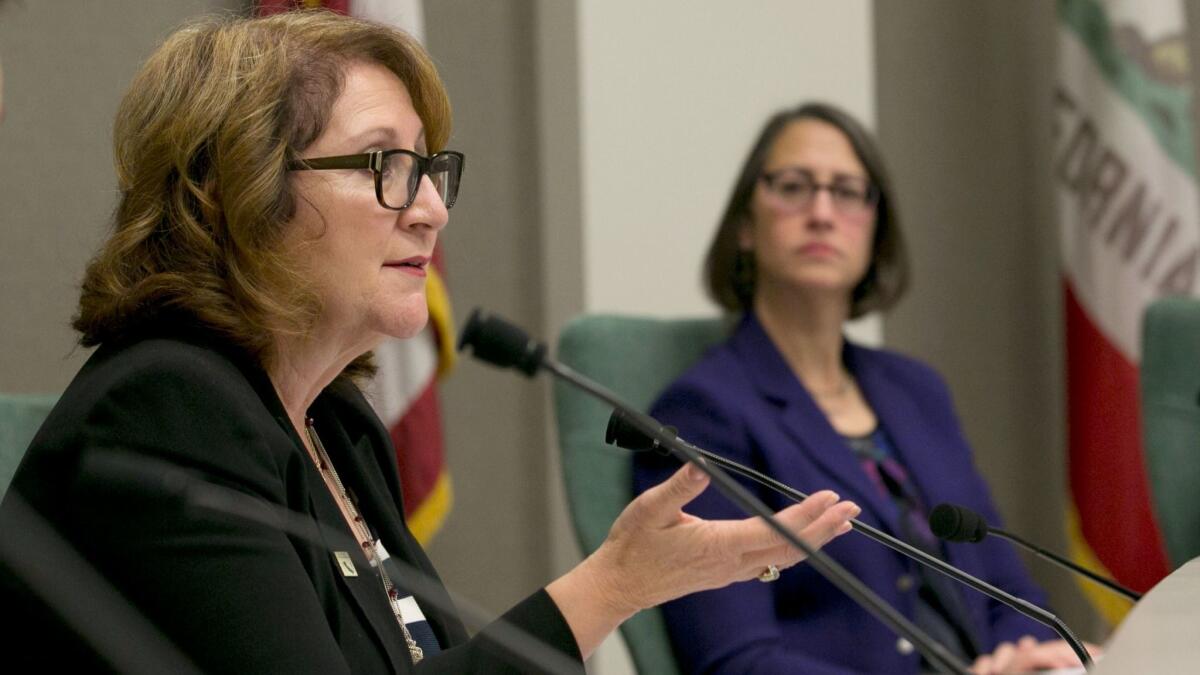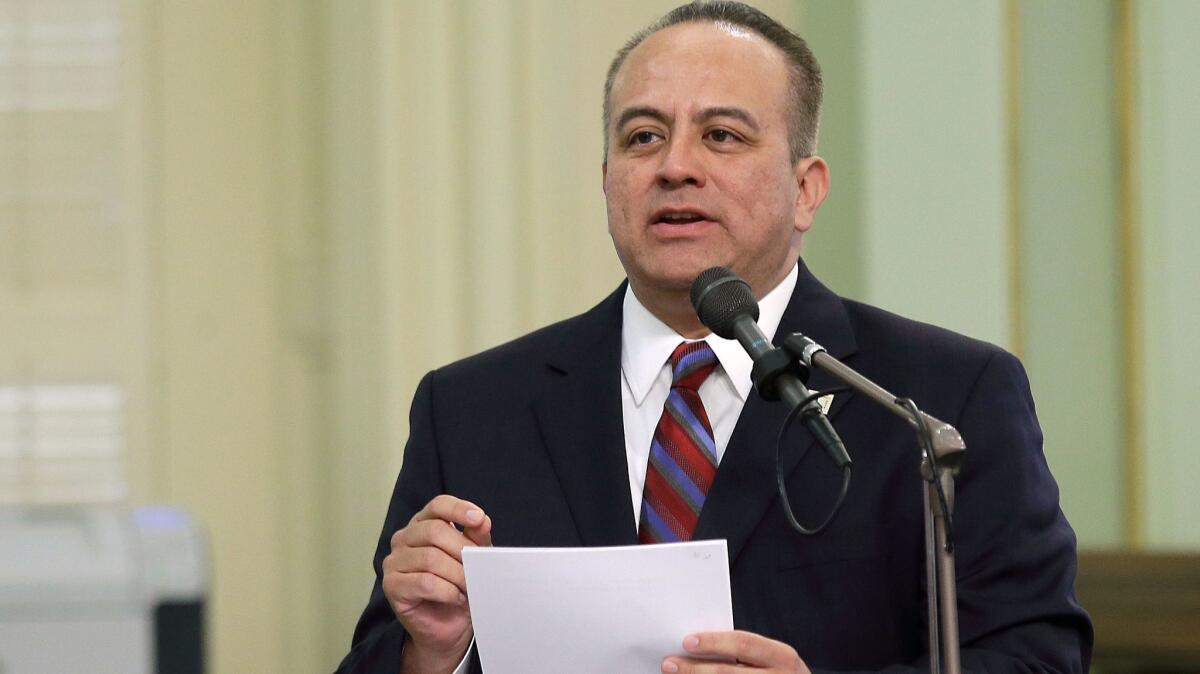California Assembly hearing on sexual harassment policies leaves unanswered questions

California Assembly members held a special hearing this week in what they called a first step to overhauling how the chamber handles claims of sexual misconduct and harassment.
In an almost five-hour subcommittee meeting — the first of its kind by either legislative house — staffers and lobbyists said procedures in the state Capitol have for years protected those in power, leaving victims in fear of retaliation.
The testimony also revealed that the chamber has an opaque process to report and investigate claims, no measures to track complaints and blurry ethics standards for elected officials.
Here are some of the unanswered questions:
How many accusers have come forward?
According to the Assembly policy handbook, an employee can report sexual misconduct verbally or in writing to his or her supervisor, the Assembly member he or she works for or officers and members of the Rules Committee. The chamber has what it calls a “zero-tolerance” policy for filing a claim, meaning employees can report any language or advance they deem offensive or unwanted.
At the hearing, lawmakers were unable to get a complete picture of the problem from the Rules Committee. Witnesses said victims often felt unsafe coming forward, fearing retribution from powerful bosses. Of those who did, the committee could not provide clear data on when, how often or against whom they had filed complaints.
Assembly Rules Committee Chairman Ken Cooley (D-Rancho Cordova) testified that even verbal complaints are documented, saying, “We do memorialize the conversation in some way.”
Assembly Chief Administrative Officer Debra Gravert and Human Resources Director Tosha Cherry emphasized at the hearing that they did not track all complaints — only those that result in an investigation.
Gravert also offered what initially seemed to be contradictory testimony on the number of complaints she received, first saying no complaints against Assembly members came in during the 3½ years that she has served as the chamber’s top staffer.
Later, she clarified and said her office had received several complaints against Assembly members in the last two weeks since news reports have surfaced of sexual misconduct allegations against Hollywood executives and lawmakers across the country.
How many investigations have been launched against Assembly members?
Gravert said she could not provide the number of investigations involving Assembly members over the last decade.
In response to public records requests to the Assembly and state Senate, The Times received two summary documents showing that the California Legislature has investigated 31 allegations of sexual harassment since the beginning of 2006. The Senate conducted 15 investigations, and the Assembly 16.
But many details were not disclosed, including incident dates and information on the allegations, including which of them involved lawmakers or staff. Officials also did not provide information on how the cases were resolved.
One of the investigations tallied was a 2009 claim by legislative staffer Elise Flynn Gyore, who reported she was groped by Assemblyman Raul Bocanegra (D-Pacoima), who was then a chief of staff to another lawmaker.
On Monday, Bocanegra resigned after The Times published a report last week in which six women accused him of making unwanted sexual advances. Gyore went public with her allegations against Bocanegra in an interview with The Times.
Which records are kept and for how long?
During the hearing, Gravert said Assembly policy requires officers to keep records for at least six years. That policy has raised concerns from some that records of allegations against sitting Assembly members might not be preserved. Under a 2012 change to California’s term limits law, Assembly members can now serve up to 12 years.
“But we do keep records beyond that,” she assured, not specifying which types of records are retained or how long they are kept.
In an interview Thursday, Gravert and Cherry said the Assembly has different retention policies for various types of records. The chamber has copies of complaints, or so-called note-to-file documents, dating back to 2006, running a wide gamut of claims that may or may not have been policy violations.
“If it does become an investigation, all those records are retained as long as the employee is still here,” Cherry said. “Otherwise, once they leave the state Assembly, those records would be maintained for six years post-separation. And that is for at least six years — that is the floor and not the ceiling.”

How does the Assembly decide which complaints to investigate?
As few as two people can decide whether a sexual misconduct violation has occurred: the Assembly’s chief administrative officer and the human resources director.
Gravert and Cherry said Thursday that they consult the Assembly policy manual to determine whether incoming claims are policy violations. They then decide whether to escalate the complaint to an investigation by referring it to internal human resources staff or outside counsel. Gravert said any sexual harassment policy violations against lawmakers would go to an outside investigator.
Lawmakers have raised concerns about the level of objectivity in the process. On Tuesday, Assemblywoman Eloise Reyes (D-Grand Terrace) asked how a human resources staff hired by the Assembly — a staff that reports to the Rules Committee — could truly be independent.
“I do think that investigation is, in fact, independent, because certainly our investigators are charged with determining the facts, whether we like them or not,” Cherry responded.
Have the rules been evenly enforced?
Rules against sexual harassment apply to all state Assembly employees, including senior staffers and elected officials. Assemblywoman Laura Friedman (D-Glendale) asked in the hearing how policies that seemed tailored for employees are enforced against lawmakers.
Gravert said that when a complaint of a sexual nature is filed against a member of the Assembly, “we would go to an outside investigator.” Those investigators interview all parties involved, including the member, and produce a report for the Assembly Rules Committee.
“At that point, if a member has violated the policy, the chair and the vice chair of the Rules Committee would be consulted, they would then consult with the speaker and minority floor leader as to what further action would be taken,” she said.
Some lawmakers expressed concern about the Assembly policing itself, allowing elected officials to escape the disciplinary standards faced by other legislative employees. In the history of the Assembly, Gravert said, no elected member has ever been expelled or suspended.
ALSO
Victims denounce a failing system for reporting sexual harassment at the California Capitol
Sexual harassment hearings come as California Capitol is roiled by accusations and a resignation
California's Legislature investigated 31 abuse complaints made over the past decade
Get the L.A. Times Politics newsletter
Deeply reported insights into legislation, politics and policy from Sacramento, Washington and beyond. In your inbox three times per week.
You may occasionally receive promotional content from the Los Angeles Times.








